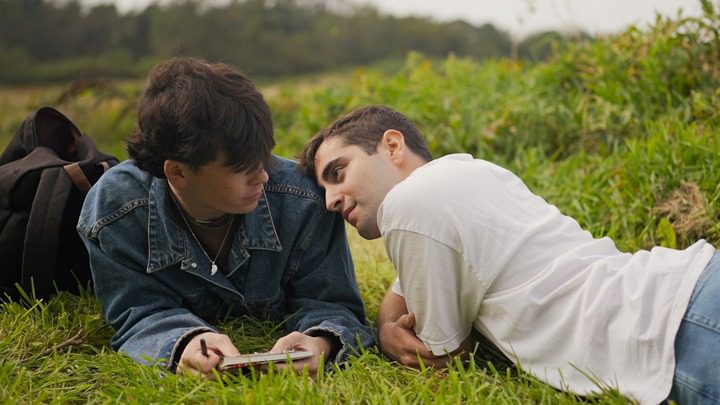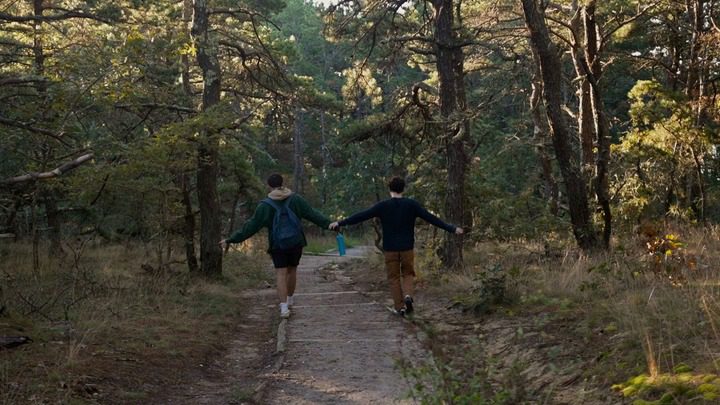Stories about coming of age and first loves are so commonplace that a reviewer can become jaded if they are not too careful. The worst ones dabble in nostalgia, while the better ones attempt to capture a feeling, not nostalgia but a tinge of sadness for the time gone by.
All of this is by way of saying Josh Cox has a new YouTube miniseries out, The Nature of Us. Like all his work, it is unabashedly Queer and unabashedly Josh Cox. Cox, a regular Renaissance filmmaker, shoots, edits, scores, directs, and writes his own stuff. Cox shoots straight from the heart and, because of that, rarely misses.
The Nature of Us, being a miniseries, is a different beast for Cox. An experimental filmmaker, he delights in playing with new forms and genres when the mood strikes. With The Nature of Us, Cox, never a slave to narratives, feels as if he’s intentionally giving himself obstacles to overcome.

The result is a miniseries that doesn’t feel like a miniseries, so much as a series of vignettes detailing Elly’s (Benjamin Piers) first summer after high school. Of the many things Cox’s script wisely does, it never tells us too much about what happened before The Nature of Us begins. It starts with Elly’s best friend, Rowen (Alison Newton), picking him up at the hospital. We discover Elly is battling depression along with his estrangement from his family.
Yet, Cox doesn’t spoon feed us this information, nor is The Nature of Us a dour depressive journey of inner struggles. Cox stays true to his nature and instead brings a meditative quality to how a person finds himself in this world. Elly meets Yona (Sean Manucha), another young man who has recently come out. It’s a small world, and it’s smaller, if you are queer in a small town.
The Nature of Us follows the tentative budding romance between Elly and Yona and how it helps Elly find himself. Cox is careful not to suggest that Yona cures Elly’s depression, but rather helps him reach for the tools to help him deal with it. Even if by the end, Elly and Yona find themselves wanting different things.
Cox takes an impressionistic eye towards storytelling. There are six episodes, at roughly ten minutes each, and it never quite feels as if there’s enough story to get us through. Not that The Nature of Us is lacking in story. In addition to Elly and Yona, there’s a subplot involving the burgeoning romance between Rowen and a girl she works with. They exist on the margins, with Cox giving us only glimpses of their life.

The result is a feeling of a world that continues to revolve even as Elly struggles with his issues and his feelings for Yona. To say nothing of how Elly wants to stay in his hometown, and Yona wants to see the world. The conflict, like everything else Cox does, is subtle and grows to a head.
But what makes The Nature of Us compelling is the way Cox uses his camera to observe Piers and Manucha’s faces. The way they attack their lines with hesitancy, unsure of this feeling inside of them, the connection. The backdrop of New England forest and windswept beaches heightens the melancholy feel. With Cox, once again, using nature to enhance the serenity both men feel when they are together.
The Nature of Us isn’t interested in melodrama, so much as vignettes exploring complicated character truths. It feels like a short story broken up into parts. Cox’s use of static shots adds to how the scenes feel like snapshots of a moment; the scenes feel like slices of time captured and being told from memory.
Piers and Manucha have a soft, easy chemistry that makes their relationship sweet. We see them gradually grow into the relationship until the eventual fracture begins to form. But Cox’s refusal to give in to neat and pat narrative endings gives The Nature of Us its emotional heft. I am reminded of the Charles Dickens quote, “Life is made of ever so many partings welded together…Divisions among such must come, and must be met as they come.” Like Dickens, Cox understands that oftentimes people find each other and then grow apart, for a myriad of reasons; many of them, mundane and natural.
Art and how it helps us cope with our traumas and fear runs through The Nature of Us. Rowen tells Elly of a residency at a local museum, and he thinks about applying. Later, Elly discovers Yona writes poetry-nobody’s perfect. The two both try and push the other to pursue their dreams. Unspoken is the way both men use creative expression, art, as a means to heal and find themselves.
Piers plays Elly close to his chest, but his eyes give him away. He plays Elly not as fragile but as a young man caught within himself, trying to find a way out. Likewise, Manucha’s Yona is open, but also guarded. He’s more outgoing, but his cheery demeanor hides a dissatisfaction. The irony is how they both help each other realize they want different things.
Cox doesn’t use music, partially because it’s a luxury he can’t afford. But he uses the silence in a way that feels like music. In the way he edits the scenes, and lets the emotions simmer and build. The yearning is the music.
The Nature of Us is a series brimming with earnest, sensual tenderness. A fascinating aspect considering Elly and Yona’s relationship is what I would call a Tuesday kind of love. They hang together and discuss whatever comes to mind. There are no grand statements or sweeping romantic gestures; instead, what Cox gives us is a story of two people idly caressing each other’s souls and feeling loved and seen.
Images courtesy of Americana Pictures
Have strong thoughts about this piece you need to share? Or maybe there’s something else on your mind you’re wanting to talk about with fellow Fandomentals? Head on over to our Community server to join in the conversation!

